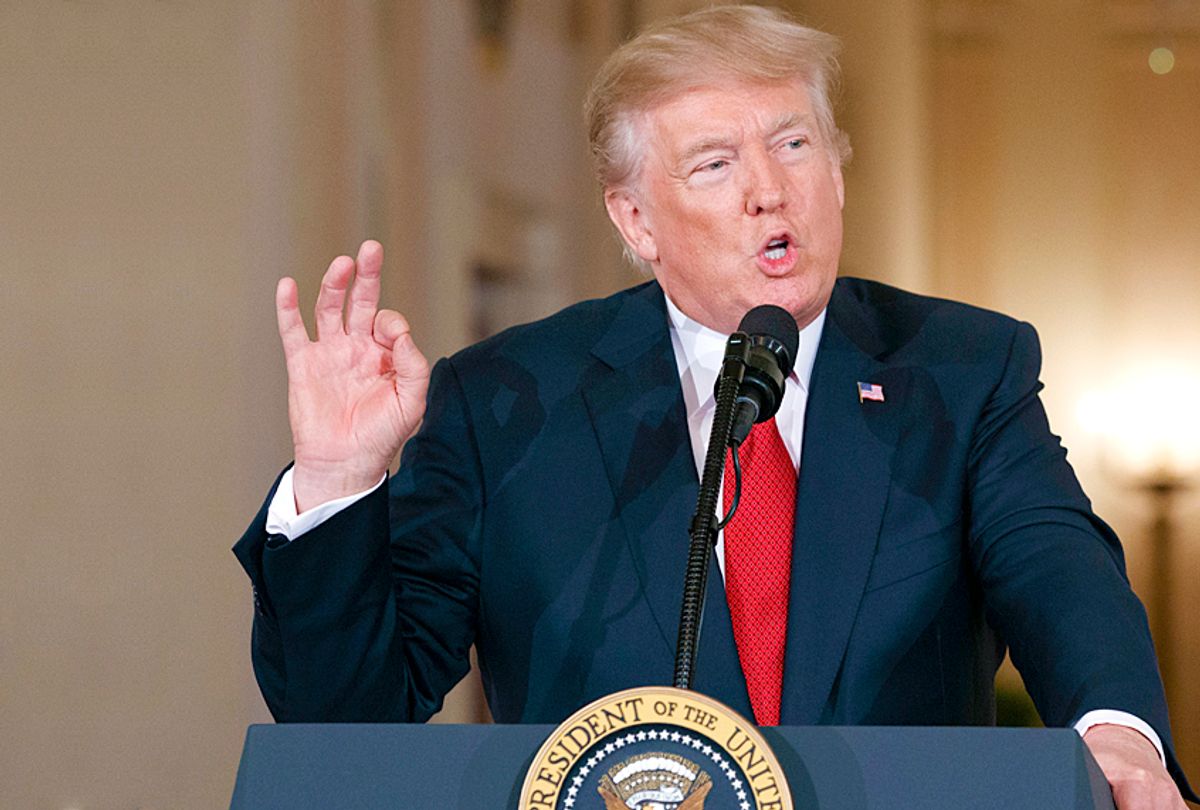Donald Trump is a fascist and a racial authoritarian. For several years, I have tried to warn the readers of my essays here at Salon and those who listen to my podcast of this fact. Trump has revealed his core values to the world at almost every opportunity. Yet somehow, too many Americans appear stuck on a treadmill of daily shock at his behavior. It is sad to watch. Why is any of this a surprise? Trump is a crude man. He has never been subtle in terms of sharing his values and beliefs.
For example, Trump signaled his presidential aspirations by accusing Barack Obama of being a black usurper born secretly in another country. Perhaps even more insulting to Barack Obama -- and by implication to Black America -- Trump even dared to suggest that the first black president of the United States was a fraud whose accomplishments and intelligence were the result of imagined unfair advantages somehow (against all empirical evidence to the contrary) granted to black people in the United States. In essence Donald Trump told a black man in the 21st century to "show me your papers," as though the latter were a slave and Trump a paddyroller on some dusty road in the antebellum South during the early 19th century.
During the 2016 campaign and now as president, Donald Trump has met almost every criteria of a fascist leader adapted to fit American society.
- He has contempt for democratic norms and procedures, and has repeated undermined them;
- He has threatened violence against his political enemies;
- He espouses militant nationalism;
- He is patriarchal, hyper-masculine and misogynist;
- He uses racism, ethnocentrism and bigotry to advance his political goals;
- He lies compulsively in order to twist reality to his will and keep supporters enthralled;
- He stokes a sense of racial grievance and victimhood among his voters;
- He acts with contempt and utter disregard for the law;
- He uses his position as president to personally enrich himself, his family and his political allies;
- He openly admires authoritarian leaders from other countries;
- Through voter purges and other means, he is trying to ensure a permanent Republican majority and de facto one-party state;
- He believes in "blood and soil" racism;
- He is trying to remove any regulations or other types of restrictions on corporations;
- He appears to be a malignant narcissist who believes he is above the law;
- He grants pardons to his political allies;
- He has utter contempt for freedom of the press and the concept of "checks and balances";
- He views intellectuals and artists as his enemies;
- He is trying to destroy labor unions;
- He encourages police and other paramilitary forces to abuse racial and ethnic minorities;
- He has been acclaimed by white supremacist and other right-wing fascist groups as their leader.
On Wednesday, Trump demonstrated his fascist beliefs again. At an Oval Office press conference with Canadian Prime Minister Justin Trudeau, he said:
It's frankly disgusting the way the press is able to write whatever they want to write, and people should look into it.
Again, there will be predictable upset by the news media, pundits, opinion writers and journalists. Democrats and maybe a few Republicans will appear on evening cable news programs to voice their concerns about Trump's tenor and behavior. But the dreaded "F-word" will likely not be uttered.
Given the obvious facts, how do we explain this avoidance of calling Donald Trump a fascist?
In different ways, both liberals and conservatives still believe in American exceptionalism, and hold tightly to a dream that the country's democratic norms and institutions can resist Trump and his movement. To suggest that fascism -- a philosophy viewed by many Americans as anathema to the country's history and best vision of itself -- could take root here is something unfathomable. Moreover, if America's leading voices in the news media, Congress and elsewhere were to label Donald Trump a fascist then other questions would be summoned by implication.
The logic is simple: If Trump is indeed a fascist then what are our obligations to stop him? The answer requires a type of engaged citizenship and courageous leadership that is uncommon in the United States.
But Republicans and movement conservatives face a very particular challenge in how they speak about Donald Trump and his fascist behavior. Despite the corporate news media's obsession with his supposedly unprecedented, "maverick" status, Donald Trump is a Republican. His behavior and political agenda are not "radical." They are the logical outgrowth of right-wing political extremism and polarization in the United States over the course of several decades.
Trump's policies have been developed by right-wing think tanks and interest groups. His racism, misogyny and bigotry reflect those of the Republican Party as whole. Trump continues to have a 81 percent approval rating among Republicans. Most worrisome for what it portends about the future of American democracy, social scientists and others have actually documented a decades-long increase in authoritarian values among Republican voters.
On those rare instances when Republicans and other conservatives do use the word fascism, it is to mock and deride Trump's critics as being hysterical and unreasonable.
Ultimately, for Republicans to publicly call Donald Trump a fascist would mean to acknowledge two things. First, that today's version of American conservatism is highly authoritarian, and second, that Trump's values are not that distinct from the Republican Party as a whole. As a matter of practical politics and personal principle this is a bridge too far for most Republicans and conservatives to cross.



Shares